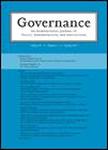-
作者:Kato, J; Rothstein, B
作者单位:University of Tokyo; University of Gothenburg
摘要:It is generally taken for granted that countries governed by leftist governments expand social policies and have an affinity for active fiscal policy that implies higher tolerance of deficit-ridden budgets. In contrast, conservative governments are taken to be less likely to favor welfare expansion, especially when it has negative fiscal consequences. We challenge this conventional wisdom by comparing the reactions of the Swedish and Japanese governments to economic crises during the 1990s. Th...
-
作者:Svensson, T; Mabuchi, M; Kamikawa, R
作者单位:Uppsala University; Kyoto University; University of Osaka
摘要:Sweden and Japan represent two different positions regarding policymaking when faced with similar crises of the bank systems. Different institutional settings led the main actors to different paths of reactions in order to avoid blame. In the Japanese case, the very close relationship between private banks and the Ministry of Finance, in combination with the lesser degree of widespread perceptions of a system crisis, made it more urgent as well as possible to conceal the actual state of affair...
-
作者:Thelen, K; Kume, I
作者单位:Northwestern University; Waseda University
摘要:The purpose of this article is to explore the political dynamics of employer coordination in three well-known coordinated market economies. We examine differences in how employer coordination has been organized in Sweden, Germany, and Japan in the area of industrial relations, and we examine the extent to which such coordination represents a self-sustaining equilibrium, as some of the most influential treatments suggest. To preview the findings, we argue that precisely the intensification of c...
-
作者:Immergut, EM; Kume, I
作者单位:Humboldt University of Berlin; Waseda University
-
作者:Scherpereel, JA
作者单位:James Madison University
-
作者:Immergut, EM; Jochem, S
作者单位:Humboldt University of Berlin; University of Bern
摘要:This article examines the impact of political institutions on the strength of executive governments as well as the consequences of that strength for policymaking. It argues that both political changes and electoral reforms in Japan and Sweden have weakened the political frame for negotiated or coordinated decision making in these nations. In Sweden, however, the complete demolition of the old political frame has opened up opportunities and incentives for new modes of governance. In Japan, by c...


